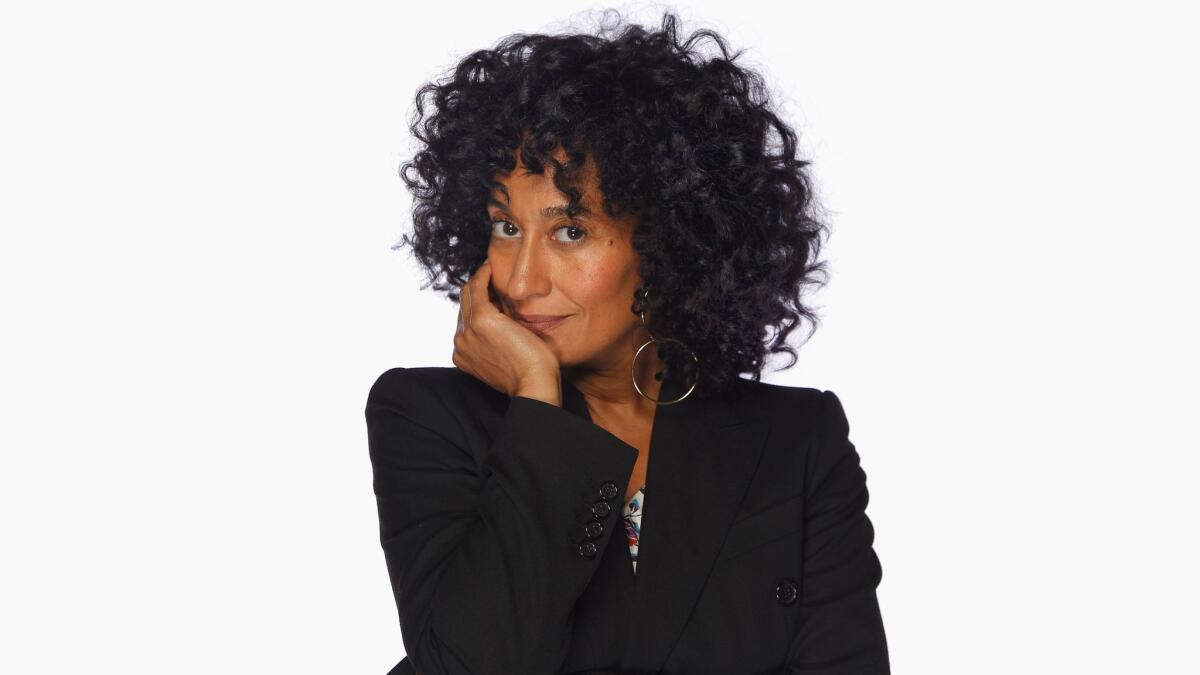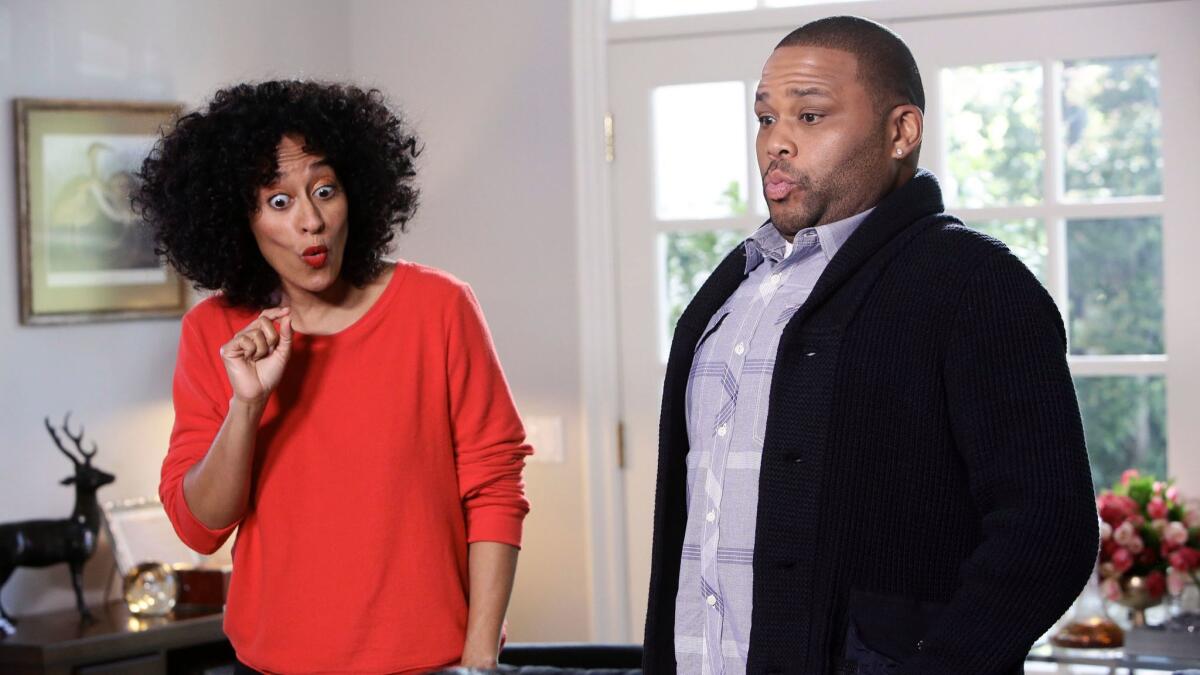When Tracee Ellis Ross looks to the future, sheās encouraged

While most probably know Tracee Ellis Ross as Rainbow on the hit āBlack-ish,ā others see Joan Clayton of āGirlfriendsā ā the early 2000s show fans would love to see earn the revival or reunion treatment.
Regardless of her career experiences, Ross is just beginning to get her due recognition. In addition to nabbing a Golden Globe earlier this year, sheās earned her second consecutive Emmy nomination. Some might say she has all the makings of a comedic superstar.
But when she takes a moment to ponder other black women who fit the bill sheās forced to think hard.
āRegina Hall ā¦ Issa Rae ... Jessica Williams,ā she said after a moment, ābut I shouldn't have to search to come up with those names. The difficulty is, and I think what happens is, you might see somebody in a role and youāre like, āHoly ...! She is so funny.ā Then she doesnāt get another opportunity, but she needs those roles because they help you build a career so everybody knows your name and knows what youāre capable of.
āAnd itās not just black comedic women. There are, Iām sure, a lot of very funny Asian women and Latina women, and we know some of them, but it's not because the talent doesn't exist. The other thing is, the talent exists, but [performers] need the experience to keep getting better and have more depth.ā
Ross is encouraged, however, by the likes of Rae.
āI think Issa is a beautiful example of āYouāre not going to give me any real estate? Fine. Iām going to make it,āā she said. āThere is revolution going on.ā
How did you settle into comedic acting?
I loved making people laugh when I was younger. It was frowned upon during dinner time but I thought it was hilarious to make my sister laugh. It was often the thing that got me kicked out of class because I was always silly. It was one of the ways my shyness manifested and the way I protected myself and kept people at bay. And Iāve always been a very physical person so when I experience a feeling, I experience it in my entire body.
As I look back, it was a natural progression into the physical comedy and the ways I use my body. In terms of my career, I donāt know that it was a conscious choice that I moved into comedy, but it was an authentic choice. I don't consider myself funny. I consider myself silly. I just tell the truth and my truth comes out in a way that makes people laugh. My goal isn't to make people laugh, but I enjoy that exchange.
I think the difficulty for actors of any kind is when you get stuck with what other people assume is who you are. Weāre actors and we can do anything.
ā Tracee Ellis Ross

Who are some of your comedic inspirations?
I was a Carol Burnett, Lucy [Ball], Lily Tomlin type of girl. They were the three women that etched it in for me. I remember looking back and seeing
And then
We seem to be reaching a moment where black women in comedy are getting some long-sought-after attention.
Iām thinking of the freedom and the different kinds of opportunities weāre experiencing right now as opposed to what I experienced growing up. This may seem trivial, but just the difference in the choice in wearing my hair natural. It wasnāt even on the map when I started. I remember someone coming up to me when I was doing āGirlfriends,ā saying, āGirl why donāt you do your hair?ā
But now you see newscasters with natural hair. And it could be considered trivial, but if you compare the journey of black women being able to experience their natural and pure and gorgeous textures in all of its glory, I feel like black women in comedy are also experiencing that revolution of being able to be all of the different kinds of funny and looks we have.
If you think of how, in general in the industry, women are meant to be one thing and they're not meant to be funny. Black women have had an even larger burden around that in terms of how we are defined and the real estate others give us. I think we have blown that open in a way. āI donāt care what real estate youāre giving me. This is what Iām capable of.ā
We know that many black women have to play the sassy best friend before they progress. Was that the same experience for you?
Iām not going to be people's immediate choice for the sassy black girl. [laughs] That's not where I'm going to get typecast. Iām game and Iām an actor but that's not people's immediate thought of me. But I do think it's changed a lot.
In my career, itās been interesting because āGirlfriendsā was eight years and I played one character for a really long time. Then I went to āReed Between the Linesā and now āblack-ish.ā I always play the same kind of woman and truthfully it's the kind of woman Iām interested in playing ā and even that woman varies. I just have never played into the stereotypes. Iāve been blessed enough that when I started my career, the roles I got afforded me the freedom to choose other roles that match me.
I think the difficulty for all of us, for actors of any kind, is when you get stuck with what other people assume is who you are. Weāre actors and we can do anything and want to play in all those areas. I donāt think thereās anything wrong with the sassy black girl or those stereotypes because my job as an actor, I believe, is to breathe humanity into those roles because there are actually people that exist in that.
But what we want is to have the roles that are seen express the breadth of who were are as people, as women, as black women. Weāre all different kinds of people, not defined by our gender or the color of our skin, yet those are very big parts of our identities.
What advice do you have for black women coming behind you who would like to do what you do?
Instead of what Iām doing, I would suggest people ask themselves what they want to be doing. What do you want to be sharing? Stay connected to that, because even if I wasn't getting jobs, I would be doing this. Perhaps I wouldnāt be paying my bills, but Iād be doing this.
The best thing Iāve learned at 44 is things take way longer than theyāre supposed to take. But it doesn't mean you're not moving in the right direction. You've just got to keep doing the next indicated thing moving you in the direction of your dream. Posting on Instagram is not necessarily the thing thatās going to move you forward, but creating content for yourself is.
If you look at the next generation, it gives me courage. Our current administration does not, but the Yara [Shahidi]s and Amandla [Stenberg]s and
Get your life! Follow me on Twitter (@TrevellAnderson) or email me: [email protected].
The biggest entertainment stories
Get our big stories about Hollywood, film, television, music, arts, culture and more right in your inbox as soon as they publish.
You may occasionally receive promotional content from the Los Angeles Times.








